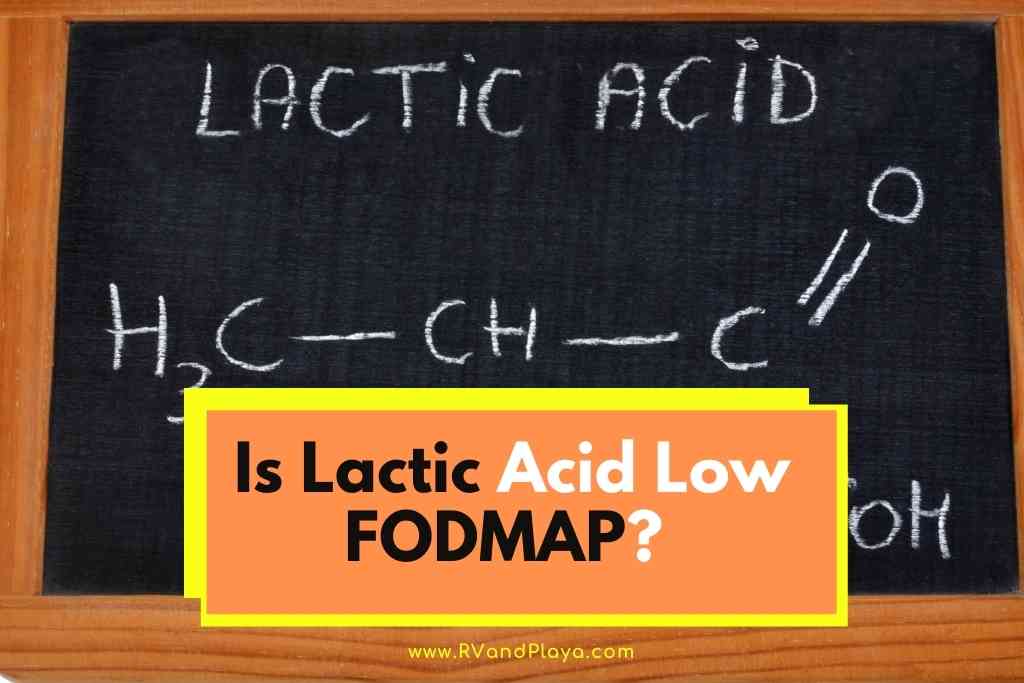Have you ever asked yourself if Lactic Acid low FODMAP? Well, you are at the perfect place to find the answer to such a question.
When you normally think of lactic acid, it’s in terms of the kind of body aches and pains that you get when your muscles are recovering from an intense workout.
However, it’s now understood that lactic acid doesn’t cause soreness and it has other applications as well, namely the fermentation process in food.
So, Is Lactic Acid Low FODMAP? No, Lactic acid’s place on the FODMAP scale is unknown. It isn’t a low FODMAP but neither has the reverse been revealed as true. The current consensus amongst scientists is that Lactic Acid is probably a FODMAP.
A lot is going on here when you consider Lactic Acid itself, the process of fermentation, and how it affects the body, whether that’s a positive effect or a negative one.
So first, we’re going to layout the process of fermentation when it comes to lactic acid.
Table of Contents
Lactic Acid Fermentation: What is It?
When we’re talking about fermentation, the first thought that generally pops up is alcohol. However, there’s another type of fermentation as well, and that is lactic acid fermentation, which functions similarly but is typically used in different consumables.
The manufacturing of yogurt, cheese, fermented milk, sauerkraut, cabbage, pickles, and many other food sources requires a fermentation process in which lactobacillus bacteria are introduced into the food source. This bacteria breaks down the carbs and the resulting leftover is lactic acid.
“Lacto-fermentation,” as the process is often called, is actually a method of preservation and the method itself has been in use for thousands of years. The process turns sugars into acid or, in other words, it turns sweet into sour.
Read Also: Is Citric Acid Low Fodmap (Bad For IBS, Powder Form)
Lactic Acid Fermentation And FODMAP?
The problem with lactic acid and its association (or lack thereof) with FODMAPs, is that it is at best, very vague. Hardly any food additives have been tested to see whether or not they qualify as a low FODMAP substance.
Since we don’t know if lactic acid qualifies as a low FODMAP, we can only make educated guesses based on what lactic acid does inside of the body, once it’s consumed, of course.
The thing is, the fermentation process changes the status of food in terms of its association with a higher or lower level of FODMAP. For example, food A and food B are both high, FODMAP foods. However, they undergo the process of fermentation, altering the carbohydrates and converting them to acids.
Once the process is complete, food A and food B are now considered to be low FODMAPs. Of course, they aren’t considered low FODMAPS, as lactic acid has never been tested to one degree or another on the subject. But, they are assumed to be low FODMAPs.
Lacto-fermentation creates an astonishingly good level of preservation and there are several examples of carbs converted to acids that you can look toward trying. If you suffer from IBS, you can try these foods and see how they affect you.
One thing is for certain, the sugar content in all of the following food sources has been drastically reduced:
- Jarred or canned pickles
- Saurkraut
- Yogurts
- Kimchi
- Sour blueberries
- Pickled chiles
Just about anything pickled is embracing Lacto-fermentation. However, not everything pickled could also be considered a low FODMAP.
So there is a great deal of variety in the Lacto-fermentation community. But is Lacto-fermentation a good thing in all circumstances or can it be bad for you?
Is Lacto-Fermentation Bad for You?
By themselves, Lacto-fermented foods are not bad for you in any way. However, that doesn’t mean that if you are fermenting these foods yourselves, the process can’t be corrupted by accident somewhere along the way.
That’s not to mention the fact that some foods are low FODMAP but will still give you problems if you are dealing with IBS (Irritable Bowel Syndrome). One of the best things that you can do, with any new food when it comes down to it, is to introduce different Lacto-fermentation foods slowly.
Read Also: Is Pectin Low Fodmap? (The Truth Nobody Is Talking About)
If you slowly introduce some of these foods into your overall diet, you will be able to build an info-base about what foods you can handle and the ones that you can’t.
One thing is for certain, however, most Lacto-fermented foods are going to have lower sugars (notably natural sugars) than non-Lacto-fermented foods.
Even though there is no official stance on the FODMAP status of lactic acid, there’s always an ingredient table on the back of any food product that you purchase, so you’re never, truly, out of the “know.”
Final Thoughts
Lactic acid is already a part of the human body as it is produced within the body.
It is not known whether or not lactic acid is a low FODMAP, however, it is a significant source of preservatives for what most would consider being pretty healthy foods, especially yogurts and blueberries.
Here are some of my favorite services, products, and Stores
There are affiliate links, so if you do decide to use any of them, I´ll earn a small commission. But in all honesty, these are the exact what I use and recommend to everyone, even my own family.
To see all my of most up-to-date recommendations, check out this resource that I made for you!
+ Products & Services
+ Convenience Stores
+ Save Thousands of Dollars
References
https://www.seriouseats.com/science-of-lactic-acid-fermentation-preservation
Recent Posts
Have you ever asked yourself or your friend if citric acid is low fodmap? Well, you are at the perfect place to find the answer to such a question. Venturing into the FODMAP diet journey can be...
Do you know if Kind Bars low FODMAP? this is one of the questions our readers ask a lot. Well, we´ve got you covered. KIND food bars are a fantastic option when you’re reaching for a snack on...


